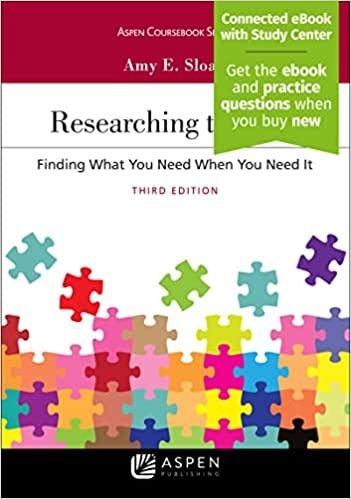Question
Plaintiff: Sweet As Sugar Defendant: CustomsRUs Facts: The plaintiff's main business is the sale of liquid sweeteners to the food and beverage industry. They also
Plaintiff: Sweet As Sugar
Defendant: CustomsRUs
Facts:
The plaintiff's main business is the sale of liquid sweeteners to the food and beverage industry. They also export their products to the United States. They have an office and employees in Ontario only.
The defendant is a United States customs broker that offers customs services and advice to mostly Canadian customers seeking to import their goods into the United States. Their main offices are located at border locations in the United States, including Buffalo, New York. They also have a sales representative who works out of an office in Ontario. His function is to attract
Canadian clients for the defendant's service as a U. S. customs broker. The defendant is also affiliated with, and a 50% shareholder in, a Canadian company located in Fort Erie, Ontario, whose business is to provide Canadian customs broker services.
In March of 1999, the then president of the plaintiff called one of the customs brokers employed by the defendant. The call was from Ontario to Buffalo. He advised the defendant's broker that he was contemplating exporting white cane sugar that was grown in Brazil, but refined in Canada, into the United States. Before he did so, he wanted to know what the applicable tariff duties were and whether there were any applicable quotas.
The defendant's employee called the plaintiff back in Ontario and provided him with information relevant to the importing of sugar into the United States. She did so on the basis of information supplied to her by the U.S. Customs Service. She told the plaintiff that sugar that was refined in Canada would be deemed to be Canadian in origin and would therefore be eligible for a preferential tariff classification number, a number that would result in a lower duty being charged by the United States customs authorities. She also told the plaintiff that the importation of sugar at this rate was subject to a quota and that they should contact a U.S. import specialist if they required further assistance in determining the applicable U. S. quota requirements. The defendant did not tell the plaintiff that all shipments of sugar being exported from Canada to the United States required an Export Permit issued by the Canadian government.
The Plaintiff did make inquiries of the import specialist to whom they had been referred. They were told that the quota was not full. Therefore, given the information provided to them by the defendant about the preferential tariff treatment they would receive, they decided to begin exporting sugar from Ontario into the United States using the defendant as their customs broker. The plaintiff and the defendant did not sign a written contract. However, in August of 1999 the plaintiff did sign a Customs Power of Attorney to permit the defendant to act as their agent for U.S. customs broker activities.
In October of 1999, the Plaintiff began exporting their sugar into the United States using the defendant as their customs broker. In March of 2000, the plaintiff's offices were raided by Canadian law enforcement agencies. At that time, the plaintiff became aware that they had illegally exported sugar from Ontario to the United States because they had not obtained a Canadian Export Permit.
They also became aware that the tariff classification number they had been using for exporting their sugar into the United States was incorrect. In fact, contrary to the advice they had received from the defendant, sugar that was originally from Brazil, but was refined in Canada, was not considered to be sugar that could be classified as being Canadian in origin. As a result, U.S. customs investigated and assessed a higher duty against the plaintiff. The plaintiff did not pay these increased duties. In June of 2001, the plaintiff's bonding agent, Aegis Security Insurance Company ("Aegis"), paid a portion of the increased duties assessed against the plaintiff pursuant to a blanket bond with respect to the sugar exports. Aegis demanded repayment from the plaintiff.
In April of 2000, Sweet as Sugar posted a number of tweets that accused CustomsRUs of negligence and also accused them of taking kickbacks from a competing sugar exporter.
Discuss what both sides should do in the future.
Step by Step Solution
There are 3 Steps involved in it
Step: 1

Get Instant Access to Expert-Tailored Solutions
See step-by-step solutions with expert insights and AI powered tools for academic success
Step: 2

Step: 3

Ace Your Homework with AI
Get the answers you need in no time with our AI-driven, step-by-step assistance
Get Started


